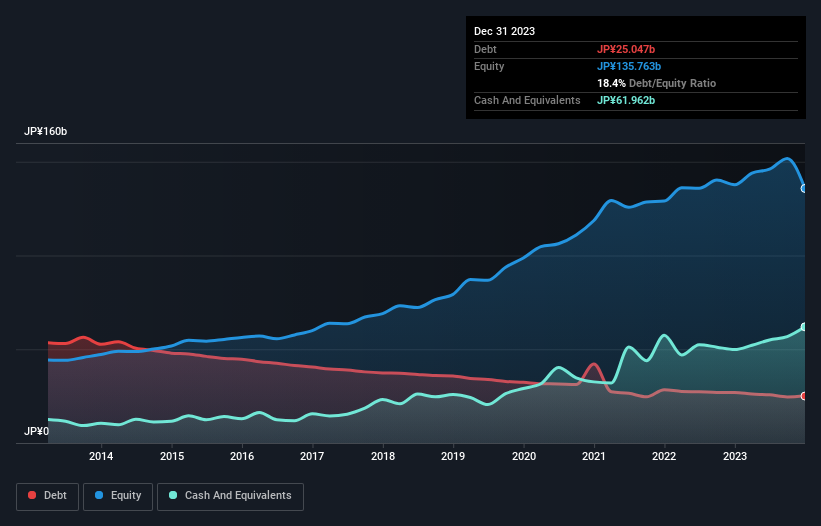- Japan
- /
- Electronic Equipment and Components
- /
- TSE:3107
Daiwabo Holdings (TSE:3107) Could Easily Take On More Debt
Some say volatility, rather than debt, is the best way to think about risk as an investor, but Warren Buffett famously said that 'Volatility is far from synonymous with risk.' So it seems the smart money knows that debt - which is usually involved in bankruptcies - is a very important factor, when you assess how risky a company is. We note that Daiwabo Holdings Co., Ltd. (TSE:3107) does have debt on its balance sheet. But the real question is whether this debt is making the company risky.
Why Does Debt Bring Risk?
Generally speaking, debt only becomes a real problem when a company can't easily pay it off, either by raising capital or with its own cash flow. In the worst case scenario, a company can go bankrupt if it cannot pay its creditors. However, a more usual (but still expensive) situation is where a company must dilute shareholders at a cheap share price simply to get debt under control. By replacing dilution, though, debt can be an extremely good tool for businesses that need capital to invest in growth at high rates of return. When we examine debt levels, we first consider both cash and debt levels, together.
Check out our latest analysis for Daiwabo Holdings
What Is Daiwabo Holdings's Debt?
As you can see below, Daiwabo Holdings had JP¥25.0b of debt at December 2023, down from JP¥26.9b a year prior. However, it does have JP¥62.0b in cash offsetting this, leading to net cash of JP¥36.9b.

How Healthy Is Daiwabo Holdings' Balance Sheet?
According to the last reported balance sheet, Daiwabo Holdings had liabilities of JP¥220.6b due within 12 months, and liabilities of JP¥32.4b due beyond 12 months. Offsetting this, it had JP¥62.0b in cash and JP¥219.1b in receivables that were due within 12 months. So it actually has JP¥28.1b more liquid assets than total liabilities.
This surplus suggests that Daiwabo Holdings has a conservative balance sheet, and could probably eliminate its debt without much difficulty. Succinctly put, Daiwabo Holdings boasts net cash, so it's fair to say it does not have a heavy debt load!
Fortunately, Daiwabo Holdings grew its EBIT by 7.9% in the last year, making that debt load look even more manageable. When analysing debt levels, the balance sheet is the obvious place to start. But ultimately the future profitability of the business will decide if Daiwabo Holdings can strengthen its balance sheet over time. So if you're focused on the future you can check out this free report showing analyst profit forecasts.
Finally, a business needs free cash flow to pay off debt; accounting profits just don't cut it. While Daiwabo Holdings has net cash on its balance sheet, it's still worth taking a look at its ability to convert earnings before interest and tax (EBIT) to free cash flow, to help us understand how quickly it is building (or eroding) that cash balance. Over the most recent three years, Daiwabo Holdings recorded free cash flow worth 57% of its EBIT, which is around normal, given free cash flow excludes interest and tax. This free cash flow puts the company in a good position to pay down debt, when appropriate.
Summing Up
While we empathize with investors who find debt concerning, you should keep in mind that Daiwabo Holdings has net cash of JP¥36.9b, as well as more liquid assets than liabilities. So we don't think Daiwabo Holdings's use of debt is risky. There's no doubt that we learn most about debt from the balance sheet. But ultimately, every company can contain risks that exist outside of the balance sheet. We've identified 3 warning signs with Daiwabo Holdings , and understanding them should be part of your investment process.
When all is said and done, sometimes its easier to focus on companies that don't even need debt. Readers can access a list of growth stocks with zero net debt 100% free, right now.
New: Manage All Your Stock Portfolios in One Place
We've created the ultimate portfolio companion for stock investors, and it's free.
• Connect an unlimited number of Portfolios and see your total in one currency
• Be alerted to new Warning Signs or Risks via email or mobile
• Track the Fair Value of your stocks
Have feedback on this article? Concerned about the content? Get in touch with us directly. Alternatively, email editorial-team (at) simplywallst.com.
This article by Simply Wall St is general in nature. We provide commentary based on historical data and analyst forecasts only using an unbiased methodology and our articles are not intended to be financial advice. It does not constitute a recommendation to buy or sell any stock, and does not take account of your objectives, or your financial situation. We aim to bring you long-term focused analysis driven by fundamental data. Note that our analysis may not factor in the latest price-sensitive company announcements or qualitative material. Simply Wall St has no position in any stocks mentioned.
About TSE:3107
Flawless balance sheet average dividend payer.
Market Insights
Weekly Picks


MicroVision will explode future revenue by 380.37% with a vision towards success


The Indispensable Artery for a New North American Economy

Agfa-Gevaert is a digital and materials turnaround opportunity, with growth potential in ZIRFON, but carrying legacy risks.
Recently Updated Narratives


Engineered for Stability. Positioned for Growth.


MINISO's fair value is projected at 26.69 with an anticipated PE ratio shift of 20x


Fiverr International will transform the freelance industry with AI-powered growth
Popular Narratives


MicroVision will explode future revenue by 380.37% with a vision towards success


NVDA: Expanding AI Demand Will Drive Major Data Center Investments Through 2026



